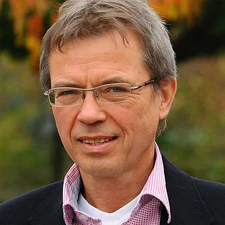Johannes Lelieveld

The 2019 Vilhelm Bjerknes Medal is awarded to Johannes Lelieveld for eminent and diverse scientific contributions and international leadership in atmospheric research in the Earth system approach, including pioneering studies linking air pollution with health.
Johannes Lelieveld, Professor and Director of the Atmospheric Chemistry Department at the Max Planck Institute for Chemistry in Mainz, is also a professor at the Cyprus Institute which he helped to establish. Lelieveld is a world-renowned atmospheric scientist with the outstanding ability to identify key scientific questions and address them by combining divers observations, laboratory studies, and numerical modeling.
Lelieveld is best known for his numerical modeling work, but he has also coordinated several major field campaigns designed to study the atmospheric chemical composition. He thus performed pioneering studies on the origin and climate impact of air pollution in ‘hot spot’ regions like the Indian Ocean, the Mediterranean and Middle East. He also found that the atmosphere’s natural self-cleaning mechanism is surprisingly very effectively stabilised and buffered through rapid recycling of highly reactive radicals, despite the rapid changes caused by anthropogenic emissions in the last century. To better understand the interplay between atmospheric composition and climate, Lelieveld was one of the first to introduce dynamical coupling of atmospheric chemistry in general circulation models. He made groundbreaking findings on the importance of long-range transport of air pollutants, and uncovered previously unknown atmospheric transport pathways. He pioneered research on how clouds and aerosols influence the chemistry of the troposphere and found that convection has a major impact on air pollutants.
Recently, Lelieveld quantified the global impact of air pollutants on human health and showed convincingly that agriculture is an important source of particulate matter, providing critical information for air pollution and climate policies. This study generated large public attention as many other Lelieveld’s research topics.
Lelieveld has inspired a plethora of early career researchers who have continued along his scientific paths to additional important discoveries. He has established international graduate and training schools where he worked and supported numerous early career scientists and their advancement in academic careers.
Lelieveld has, with his vision, leadership, communication skills and management and scientific capabilities, made tremendous contributions to research on atmospheric chemical composition, climate and health, resulting in an outstanding record of highly cited publications and in prominent advisory roles in science and policy. His scientific legacy and open-minded approach to science have been and will continue to be a great asset for the European and global research landscape.
